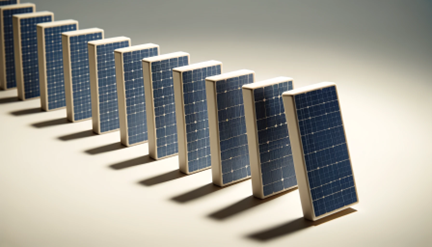We are facing an absurd situation. To protect the very small European solar glass industry, the EU Commission introduced import tariffs on solar glass many years ago. These tariffs result in European module manufacturers being uncompetitive, despite being able to procure very inexpensive solar cells from China for their modules. Some module manufacturers are on short-time work. Meyer Burger has closed its module production, and currently a few thousand jobs are at stake.
Thus, tariffs are harmful. Yet, what is the absurd reaction? To protect the module manufacturers, there are recurring considerations to introduce Europe-wide tariffs on Chinese module imports. A vicious cycle! This would endanger hundreds of thousands of jobs in the European solar industry to save a few hundred in the tiny solar glass industry.
So far, the reintroduction of tariffs on modules has been prevented. Because tariffs on Chinese modules would be a disaster for climate protection in Europe, which is why the EU Commission has rightly hesitated so far. However, the situation remains difficult for European module manufacturers.
Now there is a very simple way out of this tariff spiral: The Net-Zero Industry Act (NZIA). This prescribes resilience and sustainability criteria for some of the tenders.
The traffic light coalition in Germany has just decided in the context of consultations on the solar package that NZIA should be implemented as quickly as possible. What does this mean? Before the German federal government can present a draft law, it must wait for the implementation act of the EU Commission, which is expected by the end of the year. The legislative process will therefore start in the first half of 2025. Entry into force is then expected in the second half of the year. After that, the resilience tenders will also be given.
It can be assumed that solar glass will also be part of the privileged European value chain according to NZIA. This will secure the future of the very small European solar glass production, which can only cover a very small fraction of European demand. Double securing via solar glass tariffs will no longer be necessary. The solar glass tariffs can and should therefore be abolished in parallel with the introduction of the resilience tenders.
With the abolition of the solar glass tariffs, the competitiveness of European module manufacturers will increase dramatically; this will especially apply to glass-glass modules. Here, the tariff costs were doubly impactful.
Furthermore, European modules will also be secured by the resilience tenders in the future. The module manufacturers can not only produce much cheaper with more affordable solar glass but also have the NZIA safety net. All discussions about tariffs on module imports should be off the table now.
The roadmap is now clear. Now it is about ending the vicious cycle from the past and abolishing the artificially increased costs for European manufacturers. Thus, resilience and climate protection can be connected.
The views and opinions expressed in this article are the author’s own, and do not necessarily reflect those held by pv magazine.
This content is protected by copyright and may not be reused. If you want to cooperate with us and would like to reuse some of our content, please contact: editors@pv-magazine.com.



“Now there is a very simple way out of this tariff spiral:”. Yup.
The ECB buys low interest bonds issued by the EIB – which then uses the cash to fund not just modules but the whole PV food chain, glass, cells, silicon – the whole lot, i.e. an industrial policy that provides employment and tech.
Won’t happen because the ECB is a neo-liberal construct designed to support… banks. It is not designed to help EU industry or develo it. By contrast, the Chinese central bank does support Chinese industry – which is why China dominates PV. Sadly, the Germans seem to be functionally incapable of recognising this. (oh – & the Chinese are about to do a repeat with EVs).
Applying NZIA would affect “jobs in the European solar industry” in the same way as “Europe-wide tariffs on Chinese module imports”. Is it really that in Europe nobody can understand the pragmatism of the price? Could you imagine the same approach in automotive industry? Any kind of dumping can be approached only in one way – the hard one. Forget about anything else!